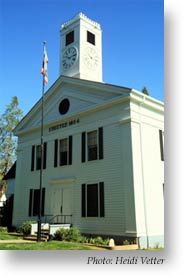|

Once
populated by Native Americans Mariposa came into
existence almost overnight via the deluge of
immigrants seeking their fortunes during the Gold
Rush. The Gold Rush at one time created a
population greater then what resides in Mariposa
today.
On February 18, 1850 Mariposa
became the largest county of the original 27
California counties. Later the county was split up
and now occupies 1,455 square miles of California's
rich Mother Lode country. Mariposa is the Spanish
name for butterfly, and aptly named by Lieutenant
Gabriel Moraga of the Mexican Army in 1806 for the
swarms of butterflies he saw along Mariposa
Creek.
John C. Fremont, an early
explorer, is responsible for founding the town
whose many streets are named after his family
members. In 1854 the famous courthouse was built on
land donated by Fremont.
In 1907 construction was
started on the Yosemite Valley Railroad. The
railroad employed as many as 1,500 men during the
early years. The railroad ran from 1907 until 1945
hauling logs, limestone and other mineral. In later
years as Yosemite grew in popularity the railroad
shuttled tourists to the new wonder. The railroad
parallels the north bank of the Merced River which
starts at 11,000 feet in the Yosemite Valley. The
river was named by Lieutenant Gabriel Moraga when
he and his soldiers had just completed a 40 mile
march. He named the river El Rio Nuestra Senora de
la Merced (The River of Our Lady of Mercy).
Attempts are under way to reconstruct the railroad
following much the same route.
Yosemite, first inhabited by
Native Americans, was first seen by settles
immigrating west for the gold rush when on March
21, 1851 Major Savage pursing "Indians" came across
the grandeur of the valley. Yosemite is a
spectacular valley filled with waterfalls, glacier
eroded spires of granite, plush meadows, meandering
streams and incredible variety of wildlife
including California's famous bears. The National
Park presents to the public an incredible setting
to discover the history of the valley.
|


